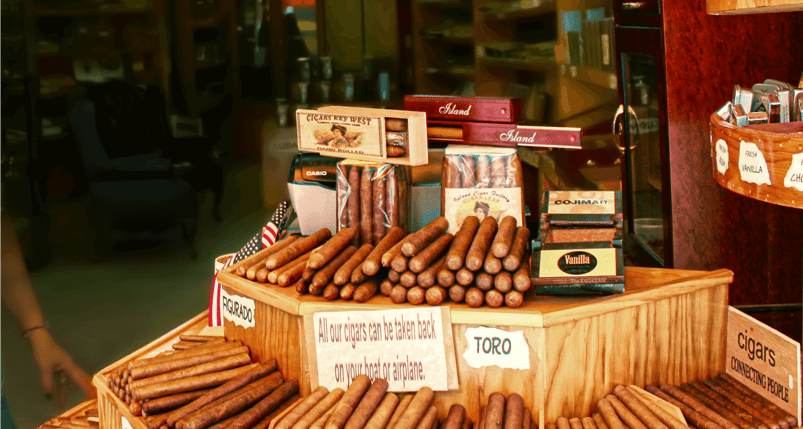How To Get Licensed To Sell CBD Products: A Guide for Smoke Shops
CBD product popularity is on the rise. By 2026, the market is expected to reach $16 billion in the U.S. alone.
With this increasing popularity, many shop owners are turning their eye toward CBD products. But there’s one barrier to consider: CBD restrictions and licensing.
Navigating the complex world of CBD licensing can be daunting, especially for those new to the industry. From understanding the differences between federal and state laws to ensuring that your products meet quality and labeling standards, there's much to consider.
Worse, failing to comply with these regulations can result in hefty fines, legal issues, and damage to your business' reputation.
So, how do you get licensed to sell CBD products? We have you covered.
This post covers the basics of how to get licensed to sell CBD inventory. We’ll discuss licensing requirements and agencies, setting you up for success in your CBD sales.
How To Get Licensed To Sell CBD Products: Advantages of Selling CBD
Any good smoke shop owner is always looking for new opportunities to attract a wider customer base. If you’re examining new product categories, you’ve probably heard a bit about CBD. But what exactly are CBD products, and how can you tell if they’re the right fit for your business?
CBD, short for cannabidiol, is a non-psychoactive compound derived from hemp or cannabis plants. Hemp-derived CBD products contain less than 0.3% THC, the compound responsible for the "high" associated with marijuana, while cannabis-derived CBD may have higher THC concentrations.
Related Read: CBD Payment Processing: 3 Considerations Before Selling CBD
If you receive the proper licenses, you can carry a variety of CBD products, including tinctures, isolates, vapes, and topical formulations. But are CBD products worth the hassle?
Selling CBD products can offer some key advantages for your smoke shop:
- Higher profit margins: CBD products often have higher profit margins than traditional tobacco products, allowing you to generate more revenue per sale.
- Growing market demand: The demand for CBD is consistently increasing, with more consumers seeking out these products for potential health and wellness benefits.
But selling CBD is not without its challenges. Some of the challenges you must keep in mind before starting to carry CBD in your smoke shop include:
- Licensing: The regulatory landscape surrounding CBD can be complex, with varying requirements at the state and local levels. Researching and understanding the specific regulations in your area is crucial to ensure compliance. Regulations may include:
- Labeling and packaging regulations, ensuring that your products clearly list ingredients, concentrations, and any required warnings.
- Maintaining Certificates of Analysis (COAs) for each product, verifying the THC concentration and other key components.
- Adhering to age restrictions for CBD sales, particularly for inhalable products, which may be limited to individuals 21 and older in some jurisdictions.
- Finding reputable suppliers: Thanks to the industry's rapid growth, many companies offer CBD products, but not all adhere to high quality and safety standards. It's essential to thoroughly vet your suppliers, reviewing their manufacturing processes, third-party lab testing results, and customer feedback to ensure you're providing reliable and effective products.
- High-risk payment processing: Some traditional payment processors may hesitate to work with businesses selling these products due to CBD's complex legal status. That’s one reason having a point of sale (POS) system that offers high-risk payment processing options is so important.
Despite these challenges, the benefits of selling CBD products can be substantial for your smoke shop. Considering these details, let’s examine some of the requirements and restrictions in the CBD market.
General CBD Laws and Legal Foundations
Before discussing the specifics of obtaining a license to sell CBD products, let's discuss the general legal requirements for all businesses.
First and foremost, you'll need to choose a business structure, either a sole proprietorship, partnership, LLC, or corporation. This choice will impact your personal liability, tax obligations, and overall management structure. Once you've selected your business entity, you'll need to register with your state and obtain a tax ID number, also known as an Employer Identification Number (EIN), from the IRS.
Related Read: How Much Does it Cost to Open a Small Business?
In addition to these basic requirements, most businesses need to obtain a general business license from their local city or county. This license grants you the right to operate within your jurisdiction and typically needs to be renewed annually. If you plan to conduct business under a name other than your own, you'll also need to file a DBA (Doing Business As) with your state or local government.
Another essential aspect of running a business is obtaining a sales tax permit. This permit allows you to collect sales tax from your customers and remit it to your state's tax authority.
These steps may seem remedial, but all these steps to opening a retail business are prerequisites for obtaining a license to sell CBD products. Attempting to sell CBD without proper licensing can result in severe consequences, including fines, legal action, and business closure.
Penalties for Improper CBD Sales
The penalties for selling CBD without a license vary by state and jurisdiction but can be severe. In some cases, unlicensed CBD sales may be treated as a criminal offense, resulting in potential jail time and substantial fines.
Even if the consequences are less severe, operating without a license can damage your reputation and make it harder to obtain proper licensing in the future.
To avoid these risks and ensure your business's long-term success, you need to establish a strong legal foundation and obtain the necessary licenses before moving forward.
Departments Responsible for CBD and Cannabis Licensing
Once you have all your standard business licensing in place, you’re ready to kick off your process for getting licensed to sell CBD products. How do you get started?
Several state and local agencies are involved in CBD licensing. These departments are responsible for regulating the cannabis industry, ensuring compliance with laws and regulations, and issuing the necessary licenses and permits.
Related Read: Delta-8 Payment Processing: What You Need To Know
At the state level, the agencies responsible for CBD and cannabis licensing vary depending on the jurisdiction.
- In California, for example, the Bureau of Cannabis Control, the Department of Cannabis Control, and the Manufactured Cannabis Safety Branch all play a role.
- Nevada has the Cannabis Compliance Board.
- Colorado has the Marijuana Enforcement Division.
- In New York, the Office of Cannabis Management oversees the state's cannabis industry.
In addition to state-level agencies, local licensing departments have a significant role in the licensing process. These may include city or county departments responsible for issuing business licenses and health departments conducting compliance checks to ensure businesses adhere to all relevant regulations.
It's crucial to research the specific agencies responsible for CBD and cannabis licensing in your state and locality, as the requirements and processes can vary significantly.
Related Read: 10 Must-Have Tobacco Software Features
Some states also have unique laws and regulations you'll need to be aware of when applying for your license. For example:
- California has specific requirements for different cannabis business categories, such as retailers, distributors, testing labs, and micro-businesses. Each category has its own set of regulations and licensing procedures.
- Nevada requires all employees and volunteers working in a cannabis business to obtain a Cannabis Agent Card. This card requires a background check and completion of a training program.
- Colorado has different licenses for key and support employees in operational roles within a cannabis business.
- New York has specific licenses for cannabinoid hemp retailers, including a Cannabinoid Hemp Retail License, Temporary Retail Permit, and Distributor Permit. The state also has THC concentration limits for CBD products and a specific licensing renewal process and timeline.
Navigating the complex web of state and local agencies with unique requirements and processes can be daunting. However, taking the time to research is essential if you want to avoid potential legal issues down the road.
CBD Business License Requirements
Let’s now explore the requirements and regulations you must consider when applying for your CBD business license. While the specific regulations may vary depending on your state and locality, there are several basic requirements that most businesses need to fulfill.
- Business registration
As discussed earlier in this post, you must properly register your business before applying for a CBD license.
- Source of CBD
Under the 2018 Farm Bill, CBD products must be derived from hemp plants that contain less than 0.3% THC. When applying for a license, you'll likely need to provide documentation verifying the source of your CBD and ensuring that it meets the required THC threshold.
- Third-party lab testing
Many states require businesses to have their CBD products tested by an independent, third-party laboratory to ensure their quality and safety. These tests verify that the products meet the required THC threshold and are free from contaminants such as heavy metals, pesticides, and residual solvents.
- Labeling and packaging
Proper labeling and packaging are critical to selling CBD products. Product labels must accurately list the amount of CBD, other ingredients, and the manufacturer's name and contact information. NOTE: Making unsubstantiated health claims on product labels is not permitted and can lead to legal issues and fines.
- Age restrictions
Most states have age restrictions for selling CBD products, particularly inhalable or vaping products. Businesses must adhere to these age limits and implement proper age verification procedures to avoid selling to underage customers.
- Zoning compliance
Some areas may have specific restrictions on where CBD businesses can operate, such as minimum distance requirements from schools or other sensitive locations. Before applying for your license, research the zoning requirements in your area and verify that your location is eligible.
- Compliance with FDA guidelines
While the FDA does not officially regulate CBD products, businesses should still strive to comply with the agency's guidelines. This includes avoiding unsubstantiated health claims, ensuring product safety, and maintaining accurate labeling and packaging.
- State licenses
In addition to the basic requirements outlined above, some states may have additional licenses or permits specifically for selling CBD products. These may include special CBD retailer licenses, distributor permits, or other state-specific requirements.
Meeting these CBD business license requirements can be complex and time-consuming, but it's crucial if you want to run a legal operation. Thoroughly researching the regulations in your area, gathering the necessary documentation, and staying informed about industry updates are the only ways to ensure you can sell CBD products without running into legal issues.
How To Get Licensed To Sell CBD Products: Managing Your CBD Sales
Congratulations on taking the first step towards expanding your business by getting licensed to sell CBD products!
By following the steps and requirements outlined in this post, you'll be well on your way to tapping into a lucrative new market and attracting a brand-new customer base.
However, obtaining the necessary licenses is just the beginning. To succeed in the CBD market, you need a reliable system to manage your sales, track your inventory, and process high-risk payments.
That's where Cigars POS comes in.
Our point of sale system is designed specifically for smoke and vape shops. With advanced inventory management features, you can easily keep track of your CBD products alongside your other offerings. Our high-risk payment processing capabilities ensure that you can confidently accept payments, while our robust reporting and analytics tools provide valuable insights into your sales trends and customer behavior.
Ready to see what Cigars POS can do for you? Schedule a demo today and experience the difference for yourself.






